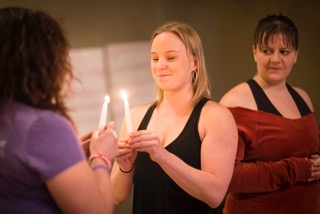Chelsea Roff is the Founder and Director of Eat Breathe Thrive (EBT), a non-profit with an inspired mission to bring yoga, mindfulness, and community support to people struggling with negative body image and disordered eating.
I reached out to Chelsea to learn more about her life and organization, which she writes, “…is like AA for people with food and body image issues, plus yoga and meditation.” Chelsea shared her journey from life as a patient to yogi, author, and innovative community organizer. With her permission, you can find this interview below.

Tell us about your journey through the mental health system.
I entered the mental health system for the first time at thirteen. After passing out during high school marching band practice, I was hospitalized. The doctors observed me for several days and diagnosed me with anorexia. I was released on the condition that I see an outpatient therapist. To say I was a non-compliant patient would be an understatement.
Several months later, the therapist refused to see me again unless I was admitted to inpatient treatment. So my parents called our insurance company, and I was sent to an adult psychiatric hospital in New Orleans. That was a crazy (no pun intended) and formative period of my life. I got a chance to form intimate friendships with the people society often dubs “insane” – often highly intelligent, creative, and sensitive. I also got excellent at playing Scrabble.
Upon returning home, I continued to starve myself. Starving was something of a life vest for me. It was the only thing that kept my mind busy enough not to get swallowed up by what had become a very tumultuous inner life. My home was chaotic – alcoholic parent, sexual assault, domestic violence – and I didn’t have the inner resources to make sense of those experiences. So I starved. When I was counting calories or running on a treadmill, there was no space for fear, or pain, or loneliness.
After losing more weight, I was sent to a residential treatment center in Florida. In some ways that place was like paradise – we had art therapy, gardening, and I felt a sense of kinship with my peers. Having an eating disorder was very functional in that regard. It got me out of a difficult home situation and into safe, stable, survivable environment.
A few months later I went back home and relapsed.
Two weeks before my 16th birthday, I suffered a minor stroke caused by the starvation. I was taken to a hospital nearly three hours from my home. I was 58 pounds. The first thing I remember is waking up in a wheelchair and not knowing where I was. It was nearly two months after the stroke.
The staff at the hospital reported my case to Child Protective Services, and I was removed from my mother’s custody. In what I gather was an unprecedented move, the state awarded legal custodianship to the staff at the hospital. My doctors and nurses became my foster parents. I remained in the psychiatric ward of the hospital for 18 months. When I was seventeen, I left the hospital and went about the task of trying to rebuild my life.
You’ve said you don’t like the word ‘recovery.’ Say more about this.
Sure. I think most people’s understanding of the word “recovery” has been heavily influenced by the substance abuse industry (and it is an industry). In that world, the prevailing paradigm is that addiction is an incurable disease, a personality type, an illness one will have for his/her entire life. You’ll often hear someone in a 12-step meeting say, “Hi, I’m _____ and I’m an alcoholic” or “I’m a recovering addict,” even after thirty years of abstinence.
I don’t see eating disorders as incurable diseases. I don’t think that once you have one, you’re doomed to struggle with it the rest of your life. I do believe eating disorders are intensely difficult to overcome. But experiencing anorexia or bulimia does not sentence you to a lifetime of negative body image, emotional eating, and self-hatred.
I use the term “fully recovered” to differentiate between not engaging in disordered eating behaviors (such as binging, purging, restricting, etc) and the experience of not having an eating disorder. Having anorexia, being in recovery from anorexia, and no longer having anorexia are all markedly different experiences. There’s a difference between going three months without purging and no longer wanting to make yourself throw up when you feel sad or scared. There’s a difference between being in recovery from anorexia and no longer looking in the mirror and seeing a fat person who isn’t there.
So often trauma is a trigger for eating disorders. Could you speak to these experiences and how yoga, specifically, facilitated new awareness or healing for you?
Sure. Let’s start by defining trauma. I define trauma as any experience that overwhelms one’s physical or emotional resources. Nearly every human being will experience trauma at some point in their life. But we were especially vulnerable during childhood, before we’ve developed an extensive repertoire of resources for self-protection and making sense of the world around us.
Many individuals who experience trauma struggle with “self-regulation.” Essentially this means that it’s difficult to find a sense of “okay-ness” in tumultuous situations. If we don’t have the resources to cope with trauma, we might attempt to soothe ourselves with whatever is available – whether it’s alcohol, food, or destructive behavior. These coping skills seem to work in the short term but are often ineffective and even dangerous in the long term.
Mindful movement practices like yoga can teach us to soothe ourselves in the face of difficult emotions… to recognize our internal experience, cope with uncomfortable emotions, and ultimately treat ourselves with compassion.
Here’s a concrete example: Let’s say you go to a yoga class, do some challenging poses, and your sympathetic (“fight or flight”) nervous system kicks into high gear. Your heart begins to race, your face flushes, and your breathing becomes more rapid. Physiologically, the experience is similar to anxiety, fear, anger. It is a mild version of the state many trauma survivors have a tough time coping with.
But just as your heart starts to race, the yoga teacher asks you to breathe a little more deeply. She reminds you that it’s okay to come into child’s pose if you need to. She encourages you to notice what’s happening inside your body and respond to it with kindness. Yoga becomes an opportunity to practice soothing yourself in the midst of anxiety. The breathing gives you a chance to amp up your parasympathetic (“rest and digest”) nervous system.
Many types of exercise – from biking to running, to weightlifting – activate the sympathetic nervous system (and that’s valuable in and of itself). But as I see it, yoga uniquely activates both branches of the autonomic nervous system. If practiced with mindfulness and intention, yoga gives you an opportunity to practice moving from “fight or flight” to “rest and digest.”

In my experience treatment itself can be traumatic. Could you speak to this?
Treatment for any mental health challenge can be traumatic. I often say that while treatment absolutely saved my life, I spent the next two years recovering from the trauma imposed by the treatment itself.
Before answering this question, I want to say that (1) Without treatment, many people who struggle with eating disorders would not be alive today, (2) Not all treatment facilities use the same modalities, (3) While treatment can be traumatic, there is currently no alternative for severely ill individuals. I also want to recognize that eating disorders are extremely difficult to treat and that the helping professionals that choose to work with this condition should be recognized for their generous and often thankless service.
But to your question… how was treatment traumatic? To start, inpatient/residential treatment can be isolating. Often patients are removed from friends, family, and familiar environments. In my case, I was taken out of school, pulled away from peers, and placed in a “bubble” where I was supposed to learn tools to implement later in the “real world.”
Treatment also involves the loss of basic freedoms most of us take for granted (like going to the bathroom in privacy or taking a walk to clear your mind). There’s a reason for this – it’s designed to keep clients safe and prevent them from engaging in disordered behaviors. In my case, I was not allowed to go outside for the first few months I was there because I was on bedrest. Even after I got off bedrest, I was only allowed outside in a gated area briefly a couple of times a day. I became depressed and suicidal. I felt like a caged animal.
Treatment can also be physically traumatic. Food regimens at eating disorder treatment centers often involve meal plans that most people would balk at — 5-6 meals a day, 5,000+ calories, and a weight gain regimen of 1-3 pounds per week. It’s important to understand the context — often treatment centers only have a few weeks to a few months to “put weight back on” an anorexic patient (because of insurance limitations), and metabolic abnormalities can make it difficult to gain weight. At times, I had to eat nearly 12,000 calories to put weight on what was at the time a very emaciated body. The eating schedule was strict. In my center, we had thirty minutes to eat, and if we didn’t finish eating, we were force fed with a nasogastric tube (a tube that goes up your nose, down your throat and into your belly). Sometimes those tubes are inserted forcibly, and that experience is just as unpleasant as it sounds.
Finally, and this might be surprising, part of the trauma associated with treatment is being discharged. After spending weeks, maybe months, of your life in this insulated, safe, structured environment, you might be abruptly sent home. Discharge is often premature because of insurance or health care limitations, and clients often find it difficult to replicate what they have learned in the real world. Most of the time clients are not able to keep their same therapist, psychiatrist, and nutritionist, so they have to start building a network of support from scratch.
Today you are Founder and Director of Eat Breathe Thrive. When was the seed for this organization planted? Who does EBT serve?
Eat Breathe Thrive is a non-profit organization I founded to prevent and help individuals fully recover from disordered eating and negative body image. Our programs include yoga, meditation, and community-building.
We have three types of programs: Clinical, Community, and College. Our clinical programs are taught by mental health practitioners in treatment centers – they serve as an adjunct to traditional forms of treatment. Our college programs are taught by educators – they help prevent eating disorders and promote healthy body image in universities and schools. Our community programs, which is the largest part of what we do, are like an AA for people with non-acute food and body image issues, plus yoga and meditation. They are led by yoga teachers and mental health practitioners in yoga studios and community centers around the world.
The seed for the organization sort of planted itself. It started with me occasionally offering talks in treatment centers, then the talks evolved into yoga classes, and over time, it grew into a six-week curriculum. Word spread, and I started receiving requests for programs in other places. So I developed facilitator training, that way others could offer the program in their own communities. The whole thing kind of got a life of its own, and a few years ago I quit my job to raise money and kickstart the nonprofit. Today, we have a full-time staff of four, nearly a hundred trained facilitators, and programs starting in the UK, Italy, Canada, and Scotland. It’s surreal!
You’ve said, “we don’t help people recover from eating disorders, we help people help each other.” Could you say more about that? And at what point did you discover the power of mutual aid?
Yes. Community, along with embodiment and service, is one of our organization’s three core values. People don’t heal from eating disorders alone. People don’t overcome any mental health challenge alone. We are human beings; we’re social creatures. We need one another. Sometimes we need friends to support us when life gets tough, when we can’t get ourselves out of bed, when our legs (sometimes literally) aren’t strong enough to carry us. Often the act of serving and supporting others brings out the best in ourselves.
The whole idea with Eat Breathe Thrive is to give people a template, a vessel if you will, to help one another. The vessel provides a space to learn coping mechanisms, build strong relationships, and develop a sense of meaning and purpose larger than oneself.
What do you envision for EBT’s future?
My focus for the future, both for myself and EBT, is quality, sustainability, and scalability. I’d like to see Eat Breathe Thrive grow to a level in which I become disposable. For the next couple years, that means putting the infrastructure in place to bring programs to those who need it most. It means enhancing our training materials. It means training facilitators in low-income communities. It means getting our content translated into Spanish, French, and Italian so we can offer programs in countries outside of the United States.
As for my personal future, who knows? The world became a lot bigger post-eating disorder. I’d say the sky’s the limit, but it’s not.















Yes, mindfulness and yoga are great, as also are biking and running. People should not have to be crippled over body image issues, though many are.
And of course I am completely opposed to all forms of Recovery and Psychotherapy because they put the blame on the victim, and they render the victims passive and compliant.
Though I have been talking about this on another thread and there are some who disagree:
http://www.madinamerica.com/2016/05/twin-method-assumptions-are-indefensible-but-are-useful-to-the-rich-and-powerful/#comment-88817
I am convinced that the destroyed self-identity which makes someone vulnerable to psychotherapy, recovery, and to eating problems, are the direct result of the middle-class family. So this is where we need to act, not in the therapists office or the 12 step group.
Join my forum, use PM’s to connect, organize, and exchange emails. Then stop recovering and act!
http://freedomtoexpress.freeforums.org/survivors-of-the-middle-class-family-t243.html
Nomadic
Report comment
I agree that starving oneself is excellent distraction from life. But I think there is more to it than that.
I was anorexic for many years and came to understand that at the root of it was a belief that I didn’t really deserve to exist. I have my own theories how that belief arose. Once I saw that, so many things became obvious, like my desperate search for validation and acceptance by others, and still feeling inferior and inadequate despite whatever recognition I did get.
Not all anorexics think they’re fat – I didn’t, for one. And it’s not so much about control either, because at some point, it becomes obvious that the not-eating has taken control of you, and even if you want to get out, you don’t know how.
I wanted someone to force me to eat, because then I would know that it was okay to do so – that I was “allowed” to eat. But my parents chose to focus on how much I was making them suffer by starving myself. (Go figure.)
It wasn’t until years later, when someone showed me compassion, someone who owed me nothing, that I felt something change, felt that I was a person of significance, that I didn’t have to be anything special in order to have a right to exist.
The truth is that I still have challenges in this respect, but I have come a very long way.
If anyone would ask me what can help an anorexic to heal, I would say just one thing: unconditional love and acceptance. A big hug, and, “Please don’t do this to yourself. I care about you.” I’m not saying that the results would be overnight transformational, but without that, forget it.
Report comment
Wow – thanks for sharing this comment -very insightful.
Report comment
Great article. Thanks. I like when stories cover fitness, yoga, diet, and mindfulness. I’m a guy that’s proud to be crazy and have a mental illness.
Report comment
Thank goodness MIA is finally publishing articles on eating disorders! About time! This little corner of the MH world usually falls between the cracks badly.
I, too, stopped using the word “recovery.” I do not say “recovered” nor “fully recovered.” By all means suffering sucks, I agree, but sometimes it’s unavoidable and much of it passes on its own.
I am much older than you. Because back in those days ED was not recognized at all (prior to Karen Carpenter’s death) I got psychiatry and therapy, but they refused to recognize my ED. Some of those fools even said I was “faking ED.” So of course it got worse due to psychiatry itself.
My experience of ED “care” after three decades when they finally figured it out was that it was abusive. It made me worse. They did, at one point, literally revive me, and then in the hospital abused me very badly. They didn’t even inform me that I had coded. For me, I know the anorexia itself was traumatic, knowing I might die if I couldn’t stop it, but the worse part was the abuse in the hospital. It has been three years now, and I am still so shook up over it.
I wish I could just cry over it. The accusations, giving me the wrong pills, calling me a liar when I wasn’t, calling me suicidal when I wasn’t, shoving me, physical and sexual abuse, stealing from me, discrediting, eye-rolling, gossiping in my presence, and then, telling me they had only kept me alive because they didn’t want a lawsuit.
I tried to sue, but with so many people who used to be my friends now condemning me, I couldn’t. I lost so many friends. I continue to lose them. The abuse ruined my ability to make and keep friends, and wrecked my conversational skills.
I don’t see myself as an exception. The trauma from care is not addressed, so this causes so many suicides after release. Most ED “care” is not luxury kiddie horse farms.
Report comment
I only know the you I’ve read on here, Julie, and a post or two on your own blog site. That being said, I like you and would be proud to call you my friend.
Report comment
Thanks. That’s so nice of you to say. The trauma of the last few years of slavery to them has been getting to me lately. It’s been a while, no resolution really.
I really deserve an apology from them. Most survivors say you don’t get one, but I am holding out for one, hoping.
Report comment
Hi Vanessa,
I’m so glad you are doing better and have started this program to help others!!! I still am horrified by the horror stories of others that I read, and that you and others just kind of take it for granted: that should NOT be!!! It’s not necessary to retraumatize a trauma victim IF people knew what they were doing!!!
My wife has d.i.d. and so eating issues and body perspective issues come with the territory. I definitely agree with you about the importance of relationships. I have pushed attachment theory with my wife before I even knew it had such name. I have walked the trenches of her battles with her and in many instances, I have literally carried her when she or the other girls wanted/needed to be carried.
But for us, it was also about balancing those internal voices/perspectives. As my wife was being traumatized during her childhood and her brain began to sequester the trauma in the other girls, she lost access to the mediating voices that those girls offered. My wife’s host still borderlines on eating issues and has terrible body image, and yet as I helped the other 7 girls heal and reconnect with the host, those 7 girls had much better body images. In fact, I still smile when I remember the one girl telling me, “I look damn hot for 50!” and all the other girls feel their body looks ‘just fine’ even though it’s not as perfect as it was when in their teens. And so those girls as they have healed have begun to offer their voices to my wife’s host and helped balance her. Now as the 8 work together, my wife (all of them) work together to maintain their weight but also is learning to deal with the imperfections that 50 brings with it…
Sam
Report comment